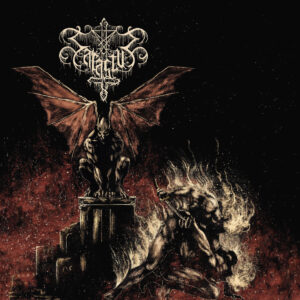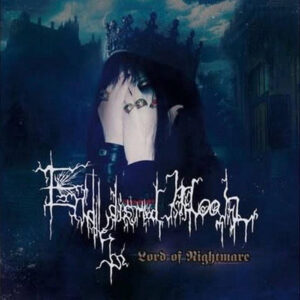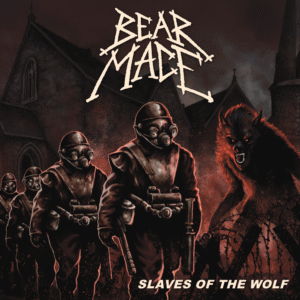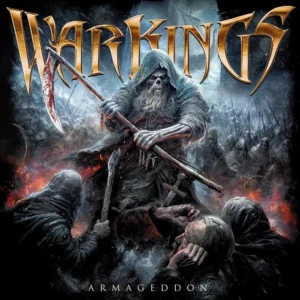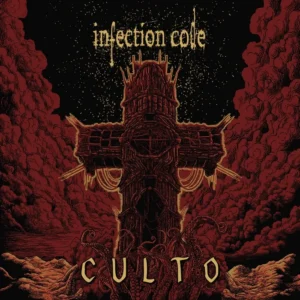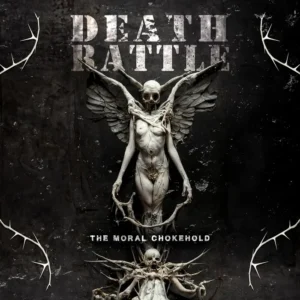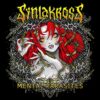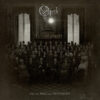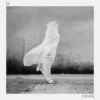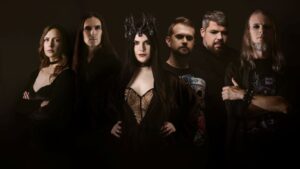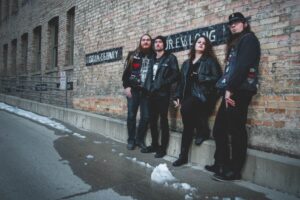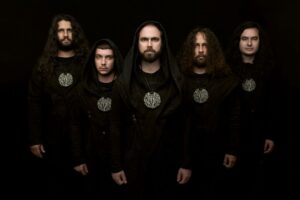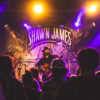M.R. Boyd & Revered J. Nibbler
Bring Out Your Dead
•
September 25, 2020
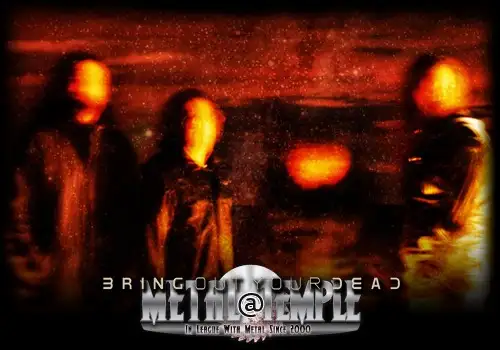

M.R. Boyd (Vocals/Guitars): We strike up the band in the early 2016 after some months of getting in touch after the split-up of our former bands [GAUNTLET and UNSOULED]. We've been friends for over 10 years and we come from Madrid, Spain. We're named after "Monty Python's Holy Grail" film, so it has a kind of comical connotation… Bring Out Your Dead refers to all things "deceased" in a certain way - ethically, spiritually, musically- Bring 'em out, throw 'em in the cart and let it go. Get rid of it.
M.R.: We really like a lot of different music. Therefore, each one of us has poured a lot of different influences upon it. We all love metal, but the inspiration sometimes comes from the most unexpected places. In my case, Glen Benton's music touches me very deeply, and so does Amy Winehouse…! Why do I have to choose?
Reverend J. Nibbler (Vocals/Guitars): Probably we try to do something that becomes a challenge for us. Not making a song with a chorus, a verse, a solo… Which is absolutely valid, of course. But for this project I think we try to do something interesting, expressive, something personal… I guess you know what we mean. And do it with our personal "tools" or inspiration. That's probably why do it mixing some influences from here or there. They're natural for us.
M.R.: Yeah, both things are correct. What we translate into music are feelings, not ideas. Passion, pain, fear, joy, sadness… Personal issues and lessons learned in life of course are topics in our lyrics, but also what is happening in/with the world, because nowadays you get unavoidably concerned by almost anything.
Reverend J. N: Anything around us might represent a topic to write about if you dig into it. Mostly feelings we have as people. It's an endless an endless source of complex ideas. For me, personally I would say that's the "topic" I write about the most. We try to make music, inspiration and lyrics that make sense. We want to create something coherent between these three pieces in a song. Sometimes when you listen to some music you think and feel they scream, shout, cry, moan over musical parts or lyrics that are not making sense. We try to use that kind of resource in a way that they help each other to make something stronger in a complete view.
M.R.: Absolutely. It has been a very hard process because it was the first time we wrote together, apart from the complexity or these songs. For example, "Rain Over Fire" or "90" were hard to tame hahaha… we thought we'd never find the way to finish them. To finish them right. We had a hard time assembling all the music but we are very proud of the final result.
Reverend J. N: I think that we would have liked to have completed the album faster ![]() Like every band I guess. But to have a good view of your work, a complete picture of a song, it takes an unavoidable amount of time. Not only the creation, but the arrangement and the whole writing process, which is much more than the fact of having a bunch of riffs following each other. At least it is from our point of view, and for the kind of tracks we want to create. You spend a lot of time playing with them, adding something, removing something… and may be changing it again if you don't feel it works after a time. This is the process that gives the tracks their final shape.
Like every band I guess. But to have a good view of your work, a complete picture of a song, it takes an unavoidable amount of time. Not only the creation, but the arrangement and the whole writing process, which is much more than the fact of having a bunch of riffs following each other. At least it is from our point of view, and for the kind of tracks we want to create. You spend a lot of time playing with them, adding something, removing something… and may be changing it again if you don't feel it works after a time. This is the process that gives the tracks their final shape.
Reverend J.N: Mmmm… I'll take some lines to talk about it. The idea for the main riff and melody for this song appeared while I was travelling through Macedonia, the country. Bikers know that feeling when you are riding, many many many times it happens that you are thinking about your own stuff feeling "alone" or in private, or singing, or thinking in a song you have around your head for hours and kilometers. Your mind enters that mode. We were on a road trip and I had that main part playing in a loop in my head. Once we stopped the bikes in a layby to rest, I recorded the melody by singing it to my phone. It wasn't a very difficult part, but I thought it had a powerful feeling and we should keep it to develop and make a song of it back at home, so I didn't want to lose it. The song describes a situation where the singer faces… let's say… a tough task he has to accomplish. He knows that it will cost him a lot, for his own person in many ways. Time, energy, love, life, relationships, frustration, whatever you might be thinking now that could be important for an individual. He doubts, he has true arguments to quit, to let it go but finds the strongest reason that moves us among the rest. And that's your love for something, the need for doing something. If you feel it, you won't listen to any rational thought. You just have to do it.
At the chorus, he is talking or asking someone and making a promise, and with the use of a literary device, he communicates with that personified entity calling her using the name of the place where all the inspiration for this song showed up. The song has nothing to do with political issues or complex history that would be a different topic.
And after all, why choose Macedonia to be the first single? Probably we have a similar feeling about it. It is powerful, melodic, tremendously catchy and in only a few seconds you had 2 choruses and 2 verses flowing easily. Also a beauty instrumental middle part where we included the addition of some percussion to give it an atmosphere. It became a very good song, perfect to be the single.
Reverend J.N: The song was recorded during the quarantine of the Coronavirus crisis in 2020. In Madrid, we had to stay at home for around 3 months. Our drummer, Tim, told us something he read about Sylvia Plath. We started delving into her work, her only novel "The Bell Jar" and her poetry, which is her main body of work. We discovered what an outstanding artist she was, and that what she wrote was real, the truth. I recorded Vicente Cajiao's voice reading some selected sentences from Mikhail Bulgakov's "The Master and Margarita", and from Plath's "The Bell Jar" and "Mad Girl's Love Song" at our home studio. Vicente is the most crazy music lover I know. He used to have radio shows back in the days when it was very, very difficult in Spain, although he also worked and lived in London. He has the skill to remember any detail you can imagine of a movie or a music album. We wanted him to read something for us and put his voice on the album (you can hear him also in Kot Begemot). The original idea wasn't to put music to the whole poem, but to imagine the situation. Sadly, you easily will imagine it as we all lived that shit. Being able to see your neighbors and the street ONLY through the window, losing everything we thought was common, long hours inside the room working with those synths that rebound with an elastic metric, impossible to measure, that loss, that big hole we felt losing all those things we did back when the corona virus crisis kept us locked at our homes…
This connected me with the understanding of how outstanding Mad Girl's Love Song is, from such an outstandingly talented person like Sylvia Plath… The poem became the main idea for the song, it had to be like that, a whole tribute to her. But we didn't record the full poem with Vicente, and we couldn't meet again so I had the idea to complete it by mixing both voices mine and his, to make track that could take all that atmosphere, just accompanying the voice and the verses with soft musical nuances, letting the main focus be on the poem. It is an amazing track, hope you also could feel it made a great communion with Plath's work. That's the tribute we wanted for her with this song.
Reverend J.N: We wanted to include a couple of interludes in the album. Initially, we thought about 1 minute, 1:30 for them, but as we worked on them, they started getting, let's say, a "complete song" role and their own character. Personally, I'm very bad when I have to be specific, more schematic and effective. Just look at the length of these answers ![]()
So to be honest with ourselves, we preferred to make a couple songs out of them instead of short interludes. The tracks somehow demanded it. We wanted something atmospheric and rhythmic at the same time, and it was just after starting the work, the ideas happened by themselves. If you listen to Outrun you could notice an intro, the breaking of the song, a middle passage, a comeback to the "chorus"… it is a great song by itself, not just the interlude we initially planned. Classic synth, new age musicians and bands like Vangelis, Jean Michelle Jarre, Tangerine Dream is something we have been listening to for years and years. Also tracks from video games or movies… that kind of stuff. So those sounds are familiar for us, something natural. But probably, what really made them 100% electronic was the fact that they were finished during the quarantine. We lived here in Madrid the first months of the 2020 coronavirus crisis. For us here around March, we could not even step on the street and even less try to meet, so the work had to be finished at home. That became the perfect excuse to include in the album full-length electronic songs that might be very natural for us, but probably could be weird (or not?) in a metal album. I mean a full electronica track. But whatever… also we think that people might appreciate this work if the listener has more or less the same idea or sensitivity for music we have. It is not so unusual after all. Outrun is one of my favourite tracks of the album.
M.R.: We are very proud of how people are getting the concept of our music. Almost everybody is listening to it without prejudice and enjoying the different textures. And those who don't enjoy it are showing respect to the way we're doing it. They recognize the musical skills and the quality of the record.
M.R.: We're asking Metallica: "Hey guys, you doin' somethin' next summer…?"
M.R.: Personally, I don't care about which country… But I'd like to play at any place the crowd is not seated. Sometimes I've seen in videos that there are venues where you have thousands of seats. That sucks. I don't think that's the spirit of metal. It would be great if we could tour with bands who are friends with us, of course. Time Symmetry, Arwen, Showbiz, We All Fall, Güru… Awesome Spanish bands of different styles.
Reverend J. N: We have known each other for some years. They released Unsouled's second album and after we froze Unsouled's project, we lost contact. When BOYD's work was ready, I phoned Ivan and we spoke for hours. What's going on, what happened during all this time and all those things. And I happily checked that they not only still kept the project on the record label. They also made it much bigger and they grew as professionals. Everything around the business is very interesting, and of course talking with them helps you learn many more things about it. The whole music world is not only represented by the the big mainstream bands. I always try to pay attention when someone tells me something that they know and I don't, and try to learn.
Reverend J.N: I think we will probably try to do something honest to ourselves. Something we would like to do to enjoy and to challenge us.
M.R.: Any idea is welcome. Either good or bad, because you can always work the bad ones out and achieve something good at last… And I think we have brewed a good load of different styles here, from Death Metal to electronica and everything in between, haven't we?
Reverend J. N: I love travelling with a bike when I have some time. It is a reset for the mind. Some of us work in technology, and love what we do so much that it also becomes a hobby, we do some stuff also out of our jobs
M.R.: Killing kitties hahaha… apart from our main jobs, I like hanging out with friends, practicing sports, cooking, reading… you know, a regular guy hahaha!
Reverend J. N: I think I'd have a shot of thunder bitch. And a beer.
M.R.: After the gig, an ice cold bottle of beer, of course. Better two, please. The first one won't last ten seconds… errr, all right. Two shots of Thunder!
More results...
